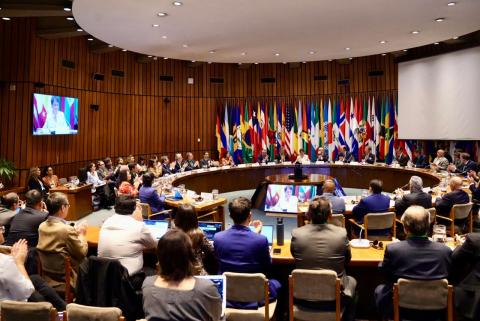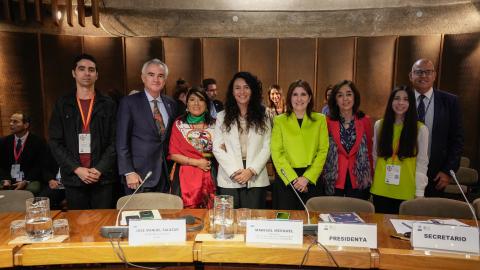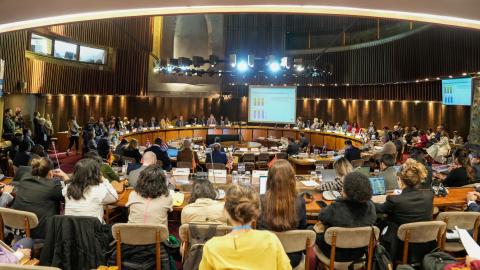News
Sustainable Development Goal 11 (SDG11) – which seeks to achieve inclusive, safe, resilient and sustainable cities and human settlements – faces a series of challenges. Access to financing and improved fiscal capacities at the local level are crucial to attaining sustainable urban development, pointed out Alicia Bárcena, Executive Secretary of the Economic Commission for Latin America and the Caribbean (ECLAC), during a side event to the High-Level Political Forum (HLPF) being held in New York.
In the meeting on “Effective Implementation, Monitoring and Financing of SDG11 - reinforcing crucial connections with development goals and enhancing policy coherence,” organized by the United Nations Human Settlements Programme (UN-Habitat), participants addressed how interdependence among the SDGs can be improved and identified the key enablers for meeting SDG11.
The event was led by Miamunah Mohd Sharif, Under-Secretary General of the United Nations and Executive Director of UN-Habitat, with participation by Sylvia Meier-Kajbic, Ambassador, Austrian Presidency of the Council of the Europe Union; Thomas De Bethune, Urban Policy Coordinator, European Union Commission; Rosario Robles, Minister of Agrarian, Territorial and Urban Development of Mexico; Carlos Zedillo, Director of the Research Center for Sustainable Development, National Housing Fund for the Workers of Mexico (INFONAVIT); Mahmoud Mohieldin, Senior Vice President for the 2030 Development Agenda, World Bank; and Eduardo López Moreno, Director of Research and Capacity Development, UN-Habitat.
In her remarks, the Executive Secretary of ECLAC pointed out that Latin America and the Caribbean is the most urbanized region in the world and has two gaps that must be filled in order to achieve enhanced urban development: high levels of income inequality and territorial segregation.
“We must view cities as global public goods. We must close the gaps, break the statistical silence, produce urban data and improve access to financing and capacities to generate the SDG11 indicators,” said Alicia Bárcena in her presentation.
She underscored that the Regional Action Plan for the implementation of the New Urban Agenda in Latin America and the Caribbean – initially revealed in the First Cities Conference, held at ECLAC headquarters in Santiago, Chile in October 2017 – is the reference framework the countries agreed on for fostering the implementation of the SDGs related to cities. The document suggests interventions and actions, as well as pertinent and priority policies for the countries of the region on the road to sustainable development of cities and human settlements by 2036. The Subregional Action Plan for the Caribbean was also adopted, which considers the specificities of that subregion and is guided by the need to develop resilient communities, cities and territories.
“The Regional Action Plan was developed in a collaborative, multi-actor process during 2016-2018. This collaboration and the strengthening of partnerships between the sectors is key to achieving urban sustainability and inclusive, safe, resilient and sustainable cities in Latin America and the Caribbean,” emphasized Bárcena.
She likewise underscored that ECLAC has chosen “The Caribbean First” as its slogan, since the small developing island states have urgent problems that must be surmounted. For this reason, it is important to bring all stakeholders, especially the private sector, to the table with local authorities to discuss the common problems associated with urbanization, as we did in the Cities Conference, which will continue to be held every year in October.
“ECLAC provides ideas, data, technical cooperation, capacity-building and a regional platform to bring together all stakeholders in the array of challenges affecting our cities. We must seek the way to incorporate these challenges into our countries’ national planning and align them with budgets, in addition to ensuring that the entire public, society and local governments participate in the decisions affecting them,” stated the regional organization’s Executive Secretary.



